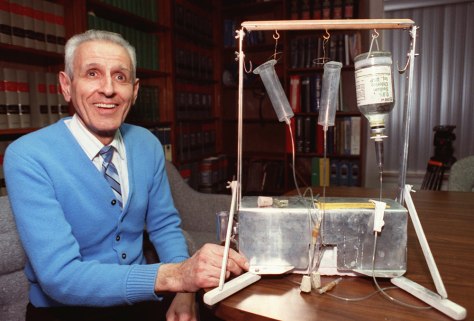God has a dream,
Verna Dozier believes, and we are the realization of that dream.
"The dream of God is that all creation will live together in peace and harmony and fulfillment. All parts of creation. And the dream of God is that the good creation that God created -- what the refrain says, 'and God saw that it was good' -- be restored," Dozier said.
The 75-year-old Washington, D.C., laywoman speaks with love and excitement about The Dream of God, which is also the title of her new book (published by Cowley Press). She also speaks with a prophet's concern and passion about what the institutional church has done to God's dream.
"The role of the church, I think, is to be the people who work with God to bring that dream about," Dozier said. "I think the people of God is the church. That can be very hard for the institution to comprehend. When the institution gets to be more important than the idea it embodies, then things have gone wrong and it loses something.
"We give our attention to the details of our structure as if the details of the structure were the important thing. There are people who really believe that if women are ordained we'd be offending God.... When we exalt those minutiae of our life to the absolute place of God, I think we are fallen.
"The essential worth of our Prayer Book, for example, is that we have a common form of worship so that wherever Anglicans go around the world, they will feel at home. That's the point of having that Prayer Book-not the particular wording of it, but that we have a common way in which we worship, and we can feel comfortable. And we should hold that as a treasure but hold it very loosely. Our faith is not dependent on that."
The gentle, almost frail figure of Verna Dozier belies the dynamic, charismatic speaker and teacher who is in great demand as a preacher, retreat director, and conference leader. After 32 years of teaching high school students English literature, Dozier began a new career at the age of 57, teaching adults about the God of Scripture. Her first experience was the result of an invitation from a group of women in Indianapolis.
'We are all theologians'"[Their convener] said to me, 'I'm tired of baking cookies and that sort of thing. Would you be interested in coming out and doing a weekend with the women of the Diocese of Indianapolis?' And I said, Well, yes, I would. I was thinking of retiring from school, and this sounded like a good way to start. So I went. It was just wonderful. We had a marvelous time. Some of my best friends in the church came out of that group."
As a result of that weekend, Dozier was later invited to speak at the 1973 triennial meeting of Episcopal Church Women (ECW) in Louisville. The reflections and talks she gave led to many invitations to do Bible studies around the country and her second career as a theologian -- a title she readily accepts because, she says, it belongs to every Christian.
"I think we are all theologians. Any time you make any statement about God, you are a theologian. Some of us don't claim that status because we reserve it for people who have great tomes in libraries. This is a great mistake, I think."
Dozier speaks with the deliberation and clarity of a skilled teacher and the enthusiasm and excitement of a committed country preacher. The transition from high school English teacher to teacher of Scripture was easy for her, she remembers. "If you teach English literature, which I did, you are always teaching about people's thoughts about God and the meaning of life. It was also an easy transition because when my sister and I learned to read, there were two books in our little poor library: one of them was Mother Goose, and the other was a book called Bible Pictures and What They Teach Us. And so my whole life has been directed in this manner.
Journey of faithDozier's own faith journey began in the Baptist Church and continued in the Unitarian and Quaker traditions. Today she is a member of St. Mark's Episcopal Church on Capitol Hill.
"I didn't decide to join the Episcopal Church. I was invited by a young priest who was really turning a fairly old, established, dying Episcopal Church on Capitol Hill on its ear, changing everything they had ever known and ever done and was intensely disliked. And one of the radical things he decided was that it was time for the Episcopal Church to have a black member. I did not know that that's what he had decided."
Dozier was a member of the Church of the Savior, a unique interdenominational gathering of Christians in Washington, D.C., who commit themselves to live New Testament Christianity through a commitment to prayer, study, and charitable outreach.
"The Church of the Savior wanted to see if its model could be reproduced in the traditional church. So the call went out for people to return to the denominational structure and live out what we learned at the Church of the Savior. Well, there were about five people who answered that call, and I was one of them.... At that time, too, I thought Episcopalians were writing the most exciting things in theology and liturgy. And it was also a time of great racial tension, and the Episcopalians at that time were really in the forefront of liberal social action.
Scripture: 'A book of wrestlings'Verna Dozier's love and respect for the Bible is evident to all who hear her; but she is not afraid to probe its revelation and ask questions. She brings to her lectures and presentations the special ability to go beyond the words of Scripture and into the meaning and human dynamics taking place in a given passage. She approaches the Bible as a "book of wrestlings" that is anything but incontrovertible or conclusive.
"I think what we have in the Bible is a story of a people and the questions they asked about the meaning of the vicissitudes of their life. And what we have in the Bible are the answers that they came up with at that particular time. And the answers change.
"In the Exodus account, there are all kinds of reasons you could give for how the Red Sea parted. But the Israelites said, 'The Lord has delivered us.' That was the meaning they gave to it. And in that response, they went on to change their lives. And that response always is under the judgment that it's a limited response, it's how I see it, and, as new experiences come to me, I might see other responses.
"That's one of my arguments with the creationists. I think they spend so much time with the mechanics of creation, rather than the meaning of creation. That's what Genesis is talking about -- the meaning. [Scripture scholar] Walter Brueggemann says the most significant thing to keep in mind about the Genesis story is that it was written during a time of great devastation for the Hebrew people. And that what they were saying in that magnificent poem is that the world is dependable, created by a dependable God. That's the faith statement.
Institutionalizing God's 'dream'In The Dream of God, Dozier writes about what she calls the "three falls of humankind" when "humankind rejected to live in a trusting, faith relationship with God." The first "fall" was the sin of Adam recounted in Genesis; the second was Israel's abandonment of its wilderness faith in favor of its political and nationalistic objectives; and the third "fall" was the Christian church accepting the role of establishment church under Constantine's Roman Empire.
"That just didn't happen when Constantine came on. The church had been concerned about power, status, and organization for a long time." That development, Dozier believes, was the beginning of the "institutionalization" and consequent loss of the dream of God.
While Dozier is often critical of the institution, her love for the church as the people of God is unmistakable. While the church can either be a place "where prophets can flourish" or a place "where the spiritual life can flourish," she contends that the church cannot be both at the same time because "it has to be the church of all the people."
"We forget that complexity of differences in the New Testament church. We like to say it's unified, yet we're always romanticizing about the day when the church will speak with one voice. The church has never spoken with one voice, not since time immemorial."
The church, Dozier believes, must be a place where everyone can come and live the "risk" of faith.
"Faith is a risk because I believe with all my heart and mind and soul in something I can't prove. And I have no need to prove it....
"We can move logically from creation to creator. But we can't move logically from a creator to a creator who is for us [and loves us]. That's faith."
Originally Published - May 13, 1992
Episcopal News Service
Jay Cormier , Diocese of Massachusetts











